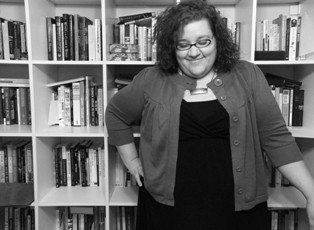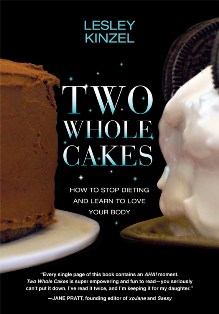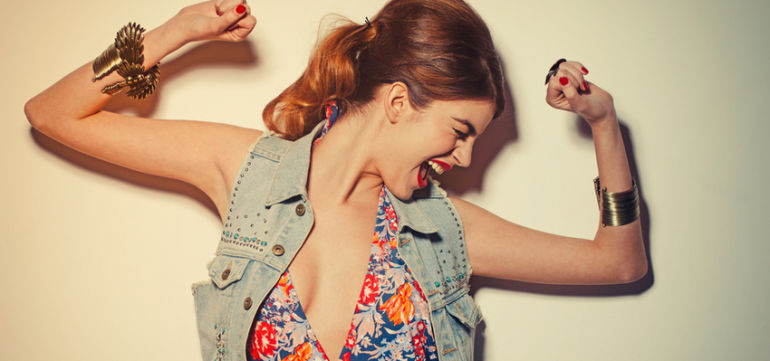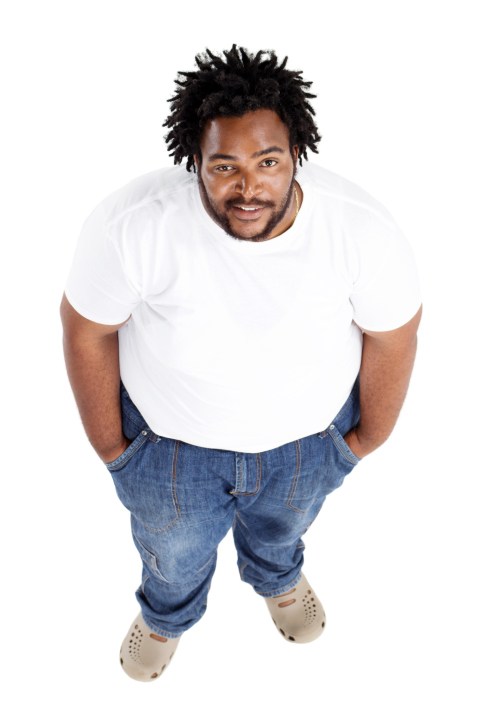Fat Activist Lesley Kinzel on How to Stop Dieting and Start Loving Your Body
I'm finally tackling a subject I've been consciously avoiding: fat acceptance. For those unfamiliar with the subject, fat acceptance is all about treating fat people with dignity and respect. Activists argue that the disrespect and discrimination that fat people face day in, day out is hazardous to their physical and mental health.
Truthfully, I'm all for self-acceptance, but I've had trouble embracing the fat acceptance movement. While I wholeheartedly agree that everyone deserves dignity and respect, when it comes to abandoning healthy, sustainable weight loss as a goal, well, I'm not so sure that's such a good idea. I've certainly tried to cozy up to the range of ideas, but after several troublesome exchanges with leading advocates, the subject seemed more trouble than it was worth.
Until, that is, I devoured "Two Whole Cakes," the delightful, insightful new book by fat activist Lesley Kinzel. This self-help book that reads like a novel about Kinzel's personal war on her own obesity wasn't the only thing that opened my mind to what the movement has to offer. Kinzel's book, however, was the proverbial icing on the cake. Even if you're not interested in fat acceptance, Kinzel's thoughts are interesting on their own.
Before we get to questions and answers from our illuminating lunchtime chat, let me recount the ways I came to be more accepting of fat acceptance.
1) My views started shifting when plus-size models started striking provocative poses in the media. Best case in point: Dove's Campaign for Real Beauty. Through a series of inspired ad campaigns, the venerable soap company challenged me and my less-than-enlightened sisters to expand our definition of beauty to include a wider variety of shapes and sizes.
2) At the same time, reading the exciting new research on self-compassion, it became abundantly clear that when you're more compassionate, and less critical, about your imperfect shape, it's only natural to stop striving for physical perfection and start accepting yourself just as you are. When it comes to the health benefits of greater acceptance -- brighter outlooks, better moods, greater perspective -- size doesn't matter.
3) My big "aha" moment, as I mentioned, was "Two Whole Cakes" -- the book and the blog. For those unfamiliar with Kinzel's work, she's a popular blogger on size acceptance, fat fashion and women's issues as well as an associate editor at xoJane. After devouring "Two Whole Cakes," in which Kinzel tells stories, gives advice and challenges stereotypes about being and feeling fat, I was moved to do more than pick the mind of this compassionate one for more illuminating insights. I picked up the phone and invited Kinzel to lunch.

I was counting on the prolific wordsmith to explain fat acceptance in the same clear, quotable and laugh-out-loud language in which she writes. Plus, I simply had to see for myself if, in fact, the fat authoress was who she claims to be -- that rare woman who loves her body.
Without further adieu, one of my favorite interviews in recent history.
Q. You proudly call yourself fat? Why is that?
A. By calling myself "fat," I'm saying this is who I am. This is the body I have. This is the right body for me because it's the one I'm living with. I know there's a lot of political tangling about the use of words that are considered slurs. I wouldn't call "fat" a slur, but it's traditionally been an insult. "Fat" is not a bad word. Rather than saying "overweight," which implies there is a correct weight, I'm using "fat" purely as a descriptive word. Just using the word has acceptance almost understood. I know a lot of women don't use it that way. When they say, "I'm so fat!" what they really mean is, "Tell me I'm not."
Q. People talk about fat acceptance, but I'm not sure everyone knows what that means. Can you define "fat acceptance" and explain why we should care, especially if we're not fat?
A. It's basically the idea that fat people should have the option not to hate themselves and their bodies. Not to say that everyone has to like it, but that people should feel as enabled to take a path of self-acceptance and contentment at the size they are. It's important for women to understand that culturally, they're under so much pressure. Even the most beautiful woman has days when she thinks she's hideous. Part of that may be what people do, but part of it is this culture of perfection and this strict and narrowly-defined beauty ideal. There is a tremendous liberation in seeing and hearing from women who say, "I don't care. I am happy. I am not listening to people who tell me I'm unacceptable. I'm going to be the person that I am and I'm going to do it in the fullest, loudest manner possible."
Even if that's not your style, there's something incredibly energizing about seeing that someone can do that. Even if it makes you think: "Maybe I could be a little easier on myself. Maybe I don't need to think I won't be able to wear a bathing suit unless I drop at least five pounds." Wear the bathing suit. Wear it!

Q. Truthfully, I embrace the idea of accepting our bodies, ourselves, but I've been put off by the fat-acceptance rhetoric. Until, that is, I read "Two Whole Cakes," which is the first book on the subject that's funny, fascinating and life-changing. Who are you trying to reach?
A. Men and women. We condensed the book down for the sake of making it really accessible. You can read it in an evening. I know the book as it stands doesn't really go out of its way [to be all-inclusive], but I like to think there's something in there for men.
Q. You say: "Your body is not a tragedy," and yet, the bullying you've endured because of your size is nothing short of an American tragedy. Why do you think the obese have become the object of such disdain and cruelty?
A. I hate to blame the media, but in terms of representation, it's rare that we see fat people in circumstances that are A) not making a big deal out of their size, and B) not making them look incredibly tragic and unhappy. The most obvious example I use is "The Biggest Loser." The whole show is about how they [the contestants] need to be harassed and punished into behaving like "normal" people. Everything they're doing is wrong, so these authoritarian people come in and tell them how to live in their bodies. The reward is being recognized as a functional, contributing member of society. That's such a harmful caricature. It erases individual nuances. The reality is that people of all sizes go on vacation, fall in love, read books, write books, have jobs, kids and families. But these things get erased when your health and size are the most important things.
Q. It's the rare American woman who can say, "I love my body," but that's what you're saying. How did you learn to love all 300 pounds of yourself?
A. I am in a place where I love my body! I got there mostly because I worked really hard at it. It's possible in spurts, but we also have to acknowledge that there are also going to be days that you hate the way you look. For me, it's [loving your body is] a code for acknowledging that I'm going to have good days and I'm going to have bad days, but I'm not going to beat myself up about either. I'm just going to accept that these feelings about my body are going to change from day to day, as well as 10-20 years from now. This is a process. It's not a destination.
Q. Why did you finally stop dieting?
A. I started dieting at 8 or 9 years old, and I stopped when I was 18 because it wasn't working. I wasn't striving for acceptance at that point. It was more me saying, "I'm tired of trying and trying and trying and feeling like crap all the time (not to mention consumed by dieting and self-loathing.)" The final nail in the coffin was my gall bladder. After this absurd zero-fat, super-vegan diet that I was on before I got my gall bladder out, I only lost two or three pounds. I ate like a rabbit for almost four months and for what? I remember thinking: "I'm going to try something else. I'm going to be good to myself. I'm going to eat food that I like. I'm going to listen to my body, and be comfortable, and try that path and see where it takes me." That's where I am now.
Q. Some readers are concerned that you're giving fat people permission to give up on themselves, implying that you have given up on yourself. What do you say to those critics?
A. I'm absolutely giving fat people permission to stop dieting. I'm not saying this is what you should do or must do, but I am saying that you can stop. That you can give accepting yourself a shot. I hear from a lot of people that I'm making it OK to be fat. Well, it is OK to be fat. People are fat. [What's not OK is] the body-shaming and policing [of fat people]. Somehow, people have this idea that they've got the right to comment on fat bodies. One of the things that makes it hard to be fat, happy and healthy is you have this constant threat of harassment. Ironically, this public commentary can make it really difficult to go for a jog. It becomes a self-fulfilling disaster.
Q. In your book, you call Michelle Obama "the biggest bully of them all" for scapegoating fat kids with her Let's Move! campaign. If you could sit down with the First Lady, what would you like to say to her?
A. My most important message for Michelle Obama is that focusing exclusively on fat kids is damaging to those kids. They're already being picked on. Having this institutionalized effort to further highlight them as a problem makes their lives worse, which makes it harder for them to be the most awesome people they can be. I would have no problem whatsoever with Let's Move! if it were focused on all children, but it's a terrible way of doing what could be a very good thing. Michelle Obama has an opportunity to say, "We're going to work as hard as possible for the best possible health for all kids regardless of what their size is." She could do that without causing any harm.
Q. What can you say about your husband's size, as well as how he feels about yours?
A. He's a fat guy, and he's one of the few guys I've known who hasn't made wise-ass comments [about my size]. He's incredibly supportive [about my body], but he's not always 100 percent happy with his own. I tell him: "I want you to be as comfortable with yourself as possible. If you think being more active will help, or eating more vegetables will help, I'll support you 100 percent."
Q. Anything else you want to say that I didn't ask?
A. If nothing else, what I try to get people to walk away with is knowing that any decisions they make about their bodies and their health needs to come from a place of self-love, and not self- loathing. Decisions to diet often come from seeing an unflattering picture of yourself or seeing yourself in a mirror where you don't look the way you think you want to look. That's a bad place to be making those decisions. If you want to make changes, make sure they're coming from a place that's not "I hate my arms" or "My husband is no longer interested in me sexually." [You'd do better to make decisions from]: "I want to take care of myself. I want to feel good. I want to feel comfortable."
---
For me, Kinzel's appearance is worth at least 1,000 of her inspiring words. That this self-proclaimed "fatshionista" looks exquisitely comfortable in her own skin and her funky fashions is truly inspirational. Mindfully eating an omelette and whole wheat toast, she looked incredibly relaxed, confident and joyful in subtle shades of aqua-green.
---
So concludes this, the second installment of my new body-image series. In the third installment, you'll learn how Dr. Christiane Northrup changed her bad body image for good. If you missed the premiere post, here's the link.
Jean Fain is a Harvard Medical School-affiliated psychotherapist specializing in eating issues, and the author of "The Self-Compassion Diet." For more information, see www.jeanfain.com. If you're one of those rare women who loves her body, do leave a comment and/or contact me through my website. This blogger is in search of future profile subjects as well as effective body-image programs.
For more by Jean Fain, L.I.C.S.W., M.S.W., click here.
For more on body image, click here.
-
Being Tired Could Be Making You Fat
If you are thinking about cutting back on sleep, and are worrie
-
Lose The Weight And Keep It Off With These Tips
You cannot live with too much weight. Yo
-
How to Cut Cravings
Carol Solomon, Ph.D. There is simply nothing worse than having to
-
Have Your Pizza and Eat it: How to Make Your Pizza Diet Friendly
One of the hardest things about going on a diet, especially a strict o
-
Government Considering Paying Obese People to Lose Weight
As the obesity epidemic continues to increase, with almost 25% o
-
First Component Of Weight Loss
Any true body transformation starts with selfdiscovery. It is an insid
- DON'T MISS
- Four Things To Consider Before You Start A Diet
- The Ups And Downs Of Hypnosis For Weight Loss
- Exercises and Diet Tips For a Big Stomach
- 7 More Reasons To Stay Away From Skinny Foods
- Eat 6 Meals a Day for Maximum Weight Loss
- Surprisingly Simple Ways To Get Rid Of Belly Fat
- Fire Your Diet
- Biggest Loser Winners - What They Weigh Now
- Rip Up Your Diet-Plan and Lose 15-20% of Your Body weight by Doing the Following.
- The Shocking Reason Why You Are Fat and What You Can do about it!




